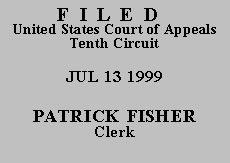

| MELVIN T. ALLEN, JR., | |
| Petitioner - Appellant, | |
| v. | |
| STATE OF OKLAHOMA, | |
| Respondent - Appellee. |
Petitioner-Appellant Melvin T. Allen appeals the district court's dismissal of his 28 U.S.C. § 2254 petition for a writ of habeas corpus. Petitioner, a state prisoner proceeding pro se, challenges the ten-year concurrent sentences he received for his conviction of unlawful possession of cocaine with intent to distribute and felonious possession of a firearm, both after former conviction of a felony. In response to Oklahoma's motion to dismiss the petition as time-barred, the magistrate judge recommended that the motion be granted and the petition be dismissed as untimely under 28 U.S.C. § 2244(d). The district court adopted the magistrate judge's recommendation and dismissed the petition as untimely. Petitioner now applies to this court for a certificate of appealability and asks us to address the merits of his petition.(1)
After reviewing Petitioner's application for a certificate of appealability, his brief, and the record, we conclude that the district court correctly determined that the petition is time-barred. Pursuant to 28 U.S.C. § 2244(d)(1)(A), Petitioner's conviction became final on July 21, 1996, upon the expiration of the ten-day time period in which he could withdraw his guilty plea. Petitioner then had one year from July 21, 1996, to file a habeas petition. Because his petition was filed over one year later, on September 16, 1998, it is untimely. Additionally, the one-year period was not tolled while Petitioner pursued state post-conviction relief because he did not seek any such relief until November 1997, four months after the one-year period of limitation had expired. Further, Petitioner has not set forth any legitimate basis for equitably tolling the running of the period of limitation.
For these reasons, we conclude that the district court properly refused to address the merits of Petitioner's habeas corpus petition, and we deny the application for a certificate of appealability and dismiss the appeal.
DENIED and DISMISSED.
Entered for the Court
Monroe G. McKay
Circuit Judge
*. This order and judgment is not binding precedent, except under the doctrines of law of the case, res judicata, and collateral estoppel. The court generally disfavors the citation of orders and judgments; nevertheless, an order and judgment may be cited under the terms and conditions of 10th Cir. R. 36.3.
1.Although the district court did not act on the issue of a certificate of appealability, the certificate of appealability is deemed denied by the district court pursuant to this court's General Order of October 1, 1996. See Tenth Circuit Emergency General Order of October 1, 1996.